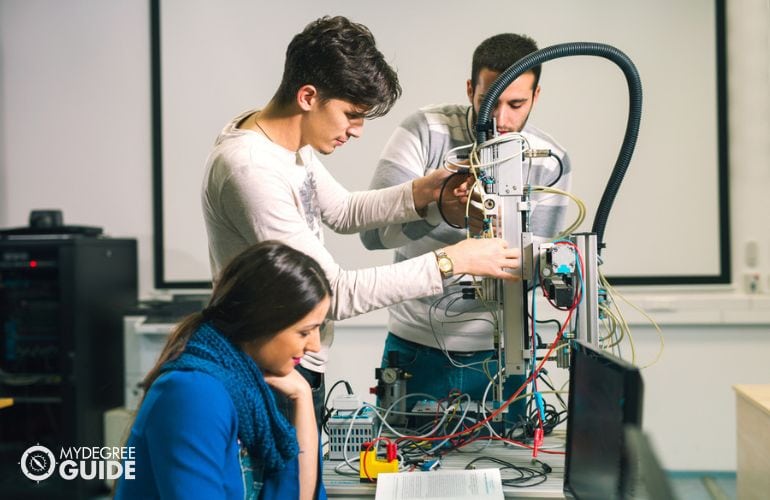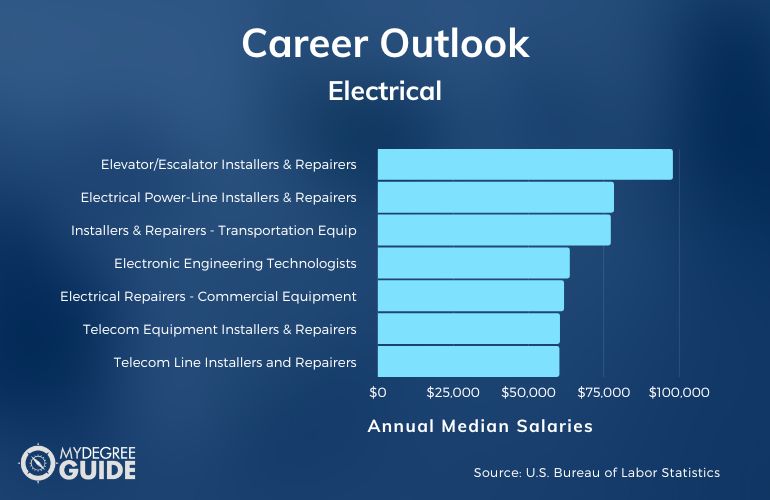Electrical technician schools prepare students for a career as an electrical technician or a similar occupation.

An electrical technician certificate is an undergraduate credential that you can obtain to gain educational experience and knowledge essential to the electrical field. Electrical technicians are responsible for installing, repairing, and maintaining electrical systems in various types of buildings.
Editorial Listing ShortCode:
Online electrical certification programs tend to offer more flexibility if you want to gain on-the-job experience through an apprenticeship while earning your certificate.
Universities Offering Online Certificates in Electrical Technician Programs
Methodology: The following school list is in alphabetical order. To be included, a college or university must be regionally accredited and offer programs online or in a hybrid format.
Alabama State University
Alabama State University offers an online course designed to prepare for a career as an electrical technician. Potential topics taught include fire safety and prevention, troubleshooting, process flow charting, electrical instruments, and electrical print reading. The course offers open enrollment and the option to start any time. Requirements for competition are met in an average of 12 months.
Alabama State University is accredited by the Southern Association of Colleges and Schools Commission on Colleges.
Auburn University
Auburn University offers an online Electrical Technician Certification program. Courses are designed to be interactive, using labs, videos, and simulations. Access to coursework is typically available any time for 6 months upon enrollment. The program may lead to national and state certification as an electrical technician and as preparation for entry-level jobs.
Auburn University is accredited by the Southern Association of Colleges and Schools.
Kennesaw State University
Kennesaw State University offers an online course aimed to teach skills needed for a career as an electrical technician. Topics often taught include electrical systems, troubleshooting, production floor safety, PLC equipment and installation, and robotics maintenance and installation. A virtual National Apprenticeship Week features online webinars and networking events to help with finding employment.
Kennesaw State University is accredited by the Southern Association of Colleges and Schools Commission on Colleges.
Texas A&M University – Corpus Christi
Texas A&M University–Corpus Christi offers an electrical technician training course online. The course aims to teach topics such as math, quality and manufacturing management, machining, and safety. Enrollment is usually open any time and coursework is typically self-paced. There commonly are no prerequisites to start the course.
Texas A&M University-Corpus Christi is accredited by the Southern Association of Colleges and Schools Commission on Colleges.
Texas State University
Texas State University offers an online course designed to teach skills needed to become an electrical technician. Potential topics taught include the basics of electrical theory and systems, PLC equipment and communication, and robotics installation and maintenance. Start dates are typically open any time and coursework is commonly self-paced. The course usually must be finished within 12 months.
Texas State University is accredited by the Southern Association of Colleges and Schools Commission on Colleges.
Tyler Junior College
Tyler Junior College offers an online electrical technician certification program. Coursework is typically available anytime and often uses labs, videos, and simulations to teach technical topics such as the National Electric Code, blueprint reading, and safety procedures. The course is designed to prepare for state and national certifications as an electrical technician.
Tyler Junior College is accredited by the Southern Association of Colleges and Schools Commission on Colleges.
University of Central Missouri
The University of Central Missouri offers an electrical technician certificate program online. Potential topics of study include math fundamentals and units of measurement, electrical/mechanical systems and motor controls, and programmable logic controllers. The open-enrollment course is typically self-paced and takes an average of 120 hours to complete.
The University of Central Missouri is accredited by the Higher Learning Commission.
University of Tennessee – Chattanooga
The University of Tennessee–Chattanooga electrical technician course online. The 120 hour program aims to teach topics such as electrical systems, robotics installation and maintenance, and PLC equipment and communication. The course is typically self-paced, and lessons are commonly available for 12 months after enrollment, but may be finished in just 6 weeks.
The University of Tennessee at Chattanooga is accredited by the Southern Association of Colleges and Schools Commission on Colleges.
University of Texas – El Paso
The University of Texas–El Paso offers an electrical technician certification course online with an optional externship. The program is usually self-paced, with access to coursework typically available any time. The course may be started at any time and is designed to prepare for the OSHA Course Completion Card.
The University of Texas at El Paso is accredited by the Southern Association of Colleges and Schools Commission on Colleges.
University of West Georgia
The University of West Georgia offers an online certification course to become an electrical technician. The course aims to teach career-related skills, including an understanding of the electrical trade and the National Electrical Code and to prepare for entry-level careers. The course may be completed in 4 to 6 months. Upon completion of the program an optional externship with a local employer is often available.
The University of West Georgia is accredited by the Southern Association of Colleges and Schools Commission on Colleges.
Online Electrical Technician Schools

Electrical technician schools provide you with the opportunity to study electrical theory and safety practices in the field. If you have an interest in electrical work and want to work in a hands-on environment, an electrical technician career might be a good fit.
Some electrical certificate programs are offered online to allow students to complete their education in a flexible learning environment. Completing your education at online trade schools could allow you to pursue an apprenticeship to gain on-the-job experience. Apprenticeships are a common path electrical professionals take to enter the field.
Electrical technicians and related professionals work with electrical wiring, lighting systems, and other electrical components needed to provide electricity to buildings and mechanisms. The curriculum of an electrical technology degree or certificate program covers a wide variety of topics essential to the field, such as:
- Electrical theory
- National Electrical Code (NEC) standards
- Wiring methods
- Industry safety protocols
- Blueprint reading
If you’re in high school, focusing on mathematics, physics, and physical education can help you prepare for the electrical field. You can also seek academic guidance from your school counselor to find out if your school offers any technology or construction trade electives.
An electrical technician certificate program can also help prepare you for other electrical careers since much of the coursework and responsibilities are similar. Examples of related careers include line installer and repairer, telecommunications line installer, and electrician.
Electrical Careers & Salaries

Electrical technician certification programs are available to teach you about electrical wiring methods, installation and testing procedures, and safety protocols of the industry.
There are numerous positions in the electrical trade that may be attainable with an electrical technology certificate. According to the Bureau of Labor Statistics, these are the median annual salaries of some electrical careers.
| Careers | Annual Median Salaries |
| Elevator and Escalator Installers and Repairers | $97,860 |
| Electrical Power-Line Installers and Repairers | $78,310 |
| Electrical and Electronics Installers and Repairers — Transportation Equipment | $77,250 |
| Electrical and Electronic Engineering Technologists and Technicians | $63,640 |
| Electrical and Electronics Repairers — Commercial and Industrial Equipment | $61,730 |
| Telecommunications Equipment Installers and Repairers | $60,370 |
| Telecommunications Line Installers and Repairers | $60,190 |
| Electricians | $60,040 |
| Solar Photovoltaic Installers | $47,670 |
| General Maintenance and Repair Workers | $43,180 |
Salaries and job availability can vary depending on your level of education, your experience in the field, and your geographic location.
The minimum education requirement for most of the jobs listed is a high school diploma, postsecondary certificate, or associate’s degree. On-the-job training for entry-level positions can usually be obtained through paid apprenticeships. Electricians typically need a high school diploma, completion of an apprenticeship, and licensure.
Electrical Technology Certificate Curriculum & Courses

The following are core or elective courses that may be offered in an electrical technology program:
- Intro to Electrical Theory and Safety: Basic electrical theory and safety procedure fundamentals are explored in this course, with emphasis on wiring methods, conduit bending, and insulators and conductors.
- Electrical Basics: Students are introduced to the electrical profession and the tools and materials commonly used for electrical work in various settings.
- Print Reading for Electrical Trades: You’ll learn how to read and interpret various blueprints, schematics, symbols, and abbreviations used in the trade.
- Applied Technical Mathematics: This course teaches you about mathematical principles and concepts used in technical trades, such as algebra, statistical methods, and trigonometry.
- Wiring Method and Power Distribution Applications: Wiring method, circuit protection, and power distribution fundamentals are explored in this course.
- Principles of Industrial Safety: This course reviews safety principles and practices, with emphasis on accident and fire prevention, first aid, safety organization, and protection equipment.
- National Electrical Code Review: This course studies the standards of the National Electrical Code, and you can learn how to interpret various codes and charts.
- Electrical Load Calculations: In this course, you’ll learn how to calculate loads and distribution systems, and you’ll also cover installation procedures for switchboards and switchgears.
- Electrical Formulas and Circuitry: This course covers mathematical formulas and electrical circuits and introduces you to the use, installation, and maintenance of electrical equipment.
- Alternative and Renewable Energy: This course may be offered as an elective to students interested in learning about alternative and renewable energy sources and systems, such as wind and polar power.
Safety standards and procedures are a main focus in the program because of the risks that come with the job, such as working with live wires and maneuvering in tight or high settings.
Admissions Requirements

Here are some basic admissions requirements that most schools require to be considered for admissions to a certificate program:
- High school diploma or GED
- Minimum age requirement of 18 years old
- Official transcripts
Some high schools offer introductory coursework to specific trades, such as construction or electrical. Most undergraduate programs, though, require students to be at least 18 years old. Admissions requirements can vary between schools and programs, but an application form is the main component of the admissions process.
Electrician Trade Schools Accreditation

Accreditation is an important factor to consider when exploring prospective electrician schools. Trade schools, colleges, and universities can seek accreditation to assure students and future employers that they meet quality educational standards set forth by accrediting organizations.
The US Department of Education’s website provides a list of recognized accrediting organizations and a database of accredited institutions you can review. Financial aid eligibility, employment opportunities, and professional certification or licensure eligibility are a few things that may be affected by the accreditation status of a school or program.
Financial Aid and Scholarships

Scholarships, grants, work-study programs, and state and federal assistance are all forms of financial aid. You can seek financial aid to potentially cut down the upfront cost of tuition and other college expenses. Federal aid is offered by the US Department of Education. You can submit a Free Application for Federal Student Aid (FAFSA) to find out if you’re eligible to receive federal aid, such as through student loans.
Scholarships are monetary awards that can be offered by various types of organizations and government entities. Scholarships typically require an application, and some have additional requirements, such as an essay. Work-study programs help students find work, typically in a part-time position, to help pay for education costs.
Is Electrical Technician a Good Career?

Yes, electrical technician is a good career for many professionals. Training to become an electrical technician can help you gain electrical skills and knowledge essential to the field.
This career path can be found in a variety of settings, such as construction, residential, and industrial. Professionals have the opportunity to advance in the field by gaining work experience or additional certification. The skills and knowledge you can acquire may apply to related positions, such as electrician, telecommunications line installer, or electrical contractor.
According to the Bureau of Labor Statistics, the annual median salary for electrical and electronic engineering technologists and technicians is $63,640, which is higher than the national median wage.
What Can You Do with a Certificate in Electrical Technology?

An electrical technician certificate can be useful for a variety of jobs that involve installing, repairing, and maintaining electrical devices. Main industries include industrial, residential, and commercial.
Specializations may be available in some programs, such as fiber and data cabling or electrical wiring for technicians. After receiving a certificate, graduates may be qualified to pursue positions as electrical technicians, electric linemen, electrician apprentices, and related roles.
Some responsibilities of electrical engineering technologists and technicians include assembling electrical systems, installing and maintaining electrical control systems, and repairing and testing electrical equipment.
How Long Is an Electrical Technician School Online?

Unlike online electrical technology degree programs, which may take up to 4 years to complete, online electrical technician programs can usually be completed in less than 1 year. Some undergraduate certificate programs can be finished in as little as 9 months if you choose to study full-time. Programs with year-round enrollment may be completed sooner as well.
If you’re enrolled as a part-time student, it will often take longer to complete your program. One potential benefit of an online electrical technician certificate program is the flexibility of your schedule. You can often choose to go at the pace that’s right for you.
What Degree Do You Need to Be an Electrician?

A bachelors degree isn’t required to become an electrician, but there are a few essential steps that professionals take to become one. Many electricians enter the field by gaining on-the-job training through a paid apprenticeship.
Electrician apprenticeships can typically be completed in 4 to 5 years. Some training hours may be fulfilled if you have prior experience in electrical work from the construction trade or similar occupations. Electricians can also earn a postsecondary certificate or associate’s degree to gain educational experience. Many states require electricians to pursue licensure, which involves passing a test.
What’s the Difference Between an Electrical Technician vs. Electrician?
Electrical technicians and electricians may share many of the same responsibilities, but here are some differences between these positions.
| Electrical Technician | Electrician |
|
|
Electrical technicians may install electrical systems under the supervision of an electrician, but many can maintain and repair systems independently. Electricians work more with the essential components of electrical systems.
Is an Electrical Technician Certificate Worth It?

Yes, an electrical technician certificate is worth it for many students. Electrical technicians are needed to provide installation and maintenance of electrical systems in industrial, commercial, and residential buildings.
The job markets for electrical jobs can vary depending on the specific occupation. For instance, electrical and electronics engineering technologist and technician positions are projected to have little to no growth over the next ten years, but around 11,100 new positions are still expected each year (Bureau of Labor Statistics).
Electrician positions are expected to have more job growth, with a projected 7% increase over the next decade and about 79,900 openings each year.
Getting Into an Electrical Technician School Online

Online electrical technician programs may be offered at trade schools, community colleges, or four-year colleges and universities.
In an electrical technician certificate program, you can learn many of the skills and responsibilities essential to the career field. You can learn about electrical theory and applications like wiring methods, circuitry, power distribution, and more. If you want to develop essential skills and knowledge applicable to the electrical field, you can start your journey by exploring online electrical technician certificate programs.
The sooner you begin researching programs from accredited schools, the sooner you may find the one that best suits your career goals and interests.
